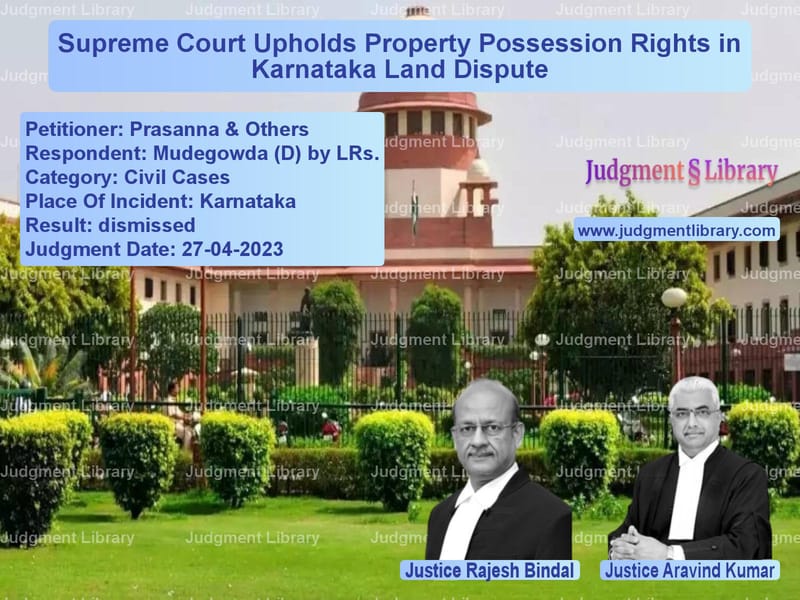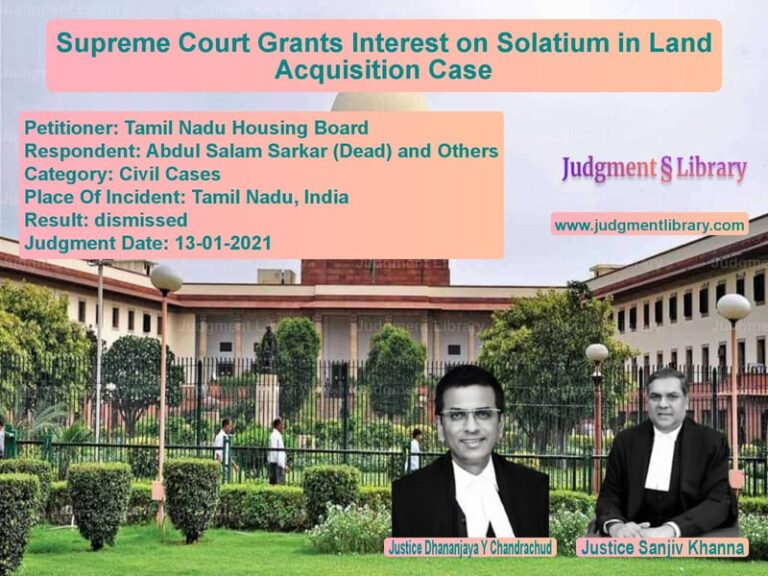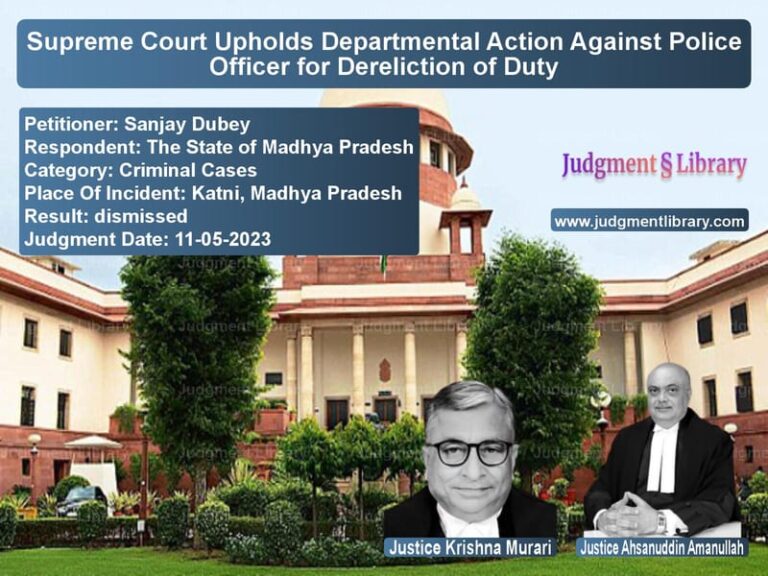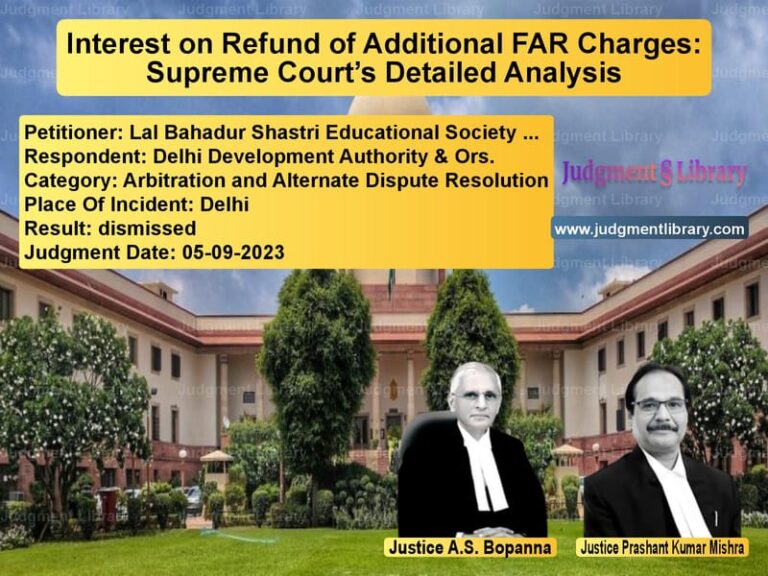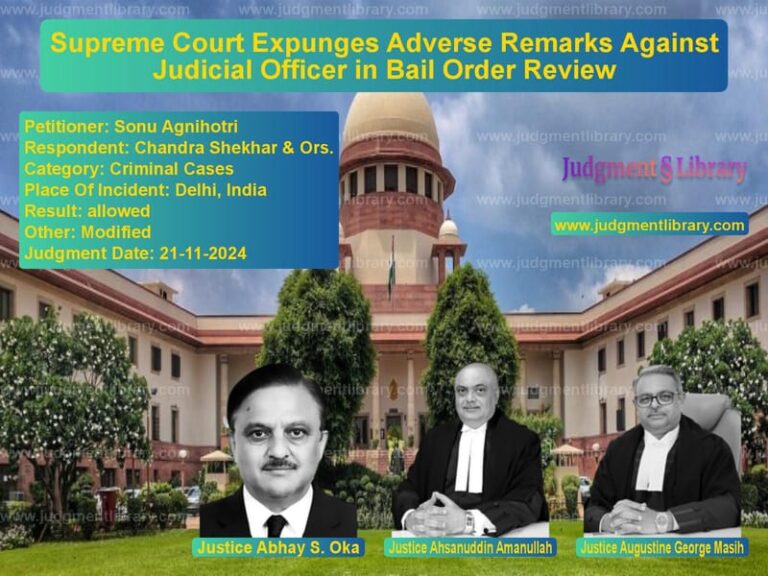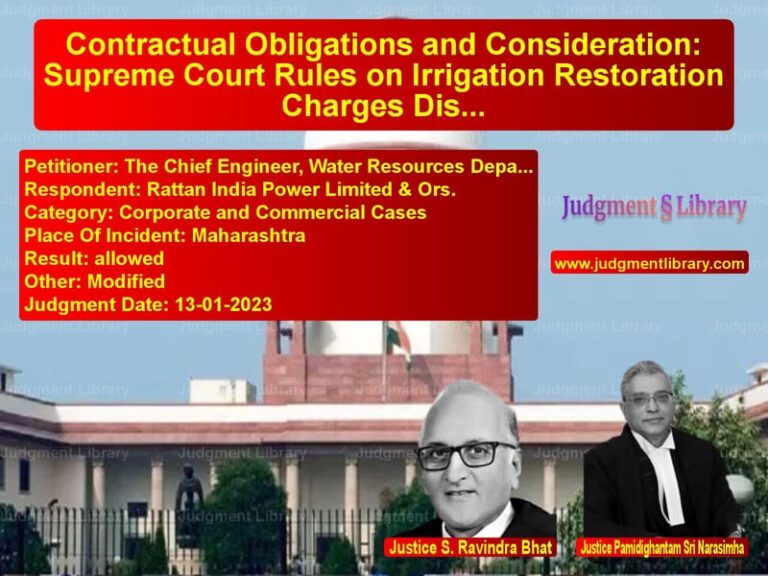Supreme Court Upholds Property Possession Rights in Karnataka Land Dispute
The case of Prasanna & Others vs. Mudegowda (D) by LRs. is a significant legal battle concerning property ownership and adverse possession claims in Karnataka. The dispute involved the sale of land, contested claims of ownership, and a long-standing legal battle over possession rights. The Supreme Court dismissed the appeal filed by Prasanna and others, ruling in favor of Mudegowda’s legal representatives. The Court reaffirmed that ownership and possession must be established through legal title and rejected the appellants’ claims of adverse possession.
Background of the Case
The dispute traces back to a sale deed executed in 1966 when the appellants’ father, Srinivas Shetty, sold the suit property to Mudegowda. The appellants, who were not born at the time of the transaction, later challenged the validity of the sale and claimed ownership. This led to multiple rounds of litigation.
Chronology of Litigation:
- 1986: The appellants filed O.S. No. 22 of 1986, seeking partition and separate possession. The trial court dismissed their claim, affirming Mudegowda’s ownership.
- 1987: The appellants filed O.S. No. 448 of 1987, seeking a perpetual injunction against Mudegowda. This was dismissed in 1988, reaffirming Mudegowda’s title.
- 1988: In response, Mudegowda filed O.S. No. 131 of 1988, seeking possession of the property. The court ruled in his favor in 1992, recognizing his legal title.
- 2003: The appellants filed RFA No. 1141 of 2003, arguing that Mudegowda’s possession claim was time-barred under Article 64 of the Limitation Act. The High Court ruled in favor of Mudegowda, leading to this Supreme Court appeal.
Legal Issues Before the Court
- Was Mudegowda’s claim for possession time-barred under the Limitation Act?
- Did the appellants acquire ownership through adverse possession?
- Did the High Court err in affirming Mudegowda’s title and possession rights?
Arguments by the Petitioner (Appellants – Prasanna & Others)
The appellants, challenging the High Court ruling, argued:
- “The High Court failed to consider the trial court’s finding that the respondent did not have possession.”
- “The claim for possession was filed after 22 years and was time-barred under Article 64 of the Limitation Act.”
- “The appellants had been in possession for over 14 years, establishing adverse possession.”
- “The respondent failed to prove actual possession at the time of filing the suit.”
Arguments by the Respondent (Mudegowda’s Legal Representatives)
The respondents defended their title and possession, arguing:
- “The High Court correctly ruled that Mudegowda was the rightful owner.”
- “The sale deed of 1966 established legal ownership, which the appellants had no right to challenge.”
- “The limitation period began from the final decision in O.S. No. 22 of 1986, not from the date of sale.”
- “The appellants failed to produce any evidence to substantiate their claim of adverse possession.”
Supreme Court’s Analysis and Judgment
The Supreme Court carefully examined the legal claims and prior judgments, making the following key observations:
- “The title of the respondent had already been declared valid in previous litigation, and the appellants’ challenge was unsustainable.”
- “For adverse possession to be established, the possession must be open, continuous, exclusive, and hostile to the owner’s title. The appellants failed to meet this standard.”
- “The claim of adverse possession contradicts the appellants’ argument that they were rightful owners. A person cannot simultaneously claim ownership and adverse possession.”
- “The possession suit was filed within six months of the final ruling in O.S. No. 22 of 1986, meaning it was within the limitation period.”
The Court ruled:
“The appeal is dismissed. The judgment of the High Court is upheld. Costs made easy.”
Key Takeaways from the Judgment
- A person claiming adverse possession must provide clear and conclusive evidence of hostile, continuous, and exclusive possession.
- Prior court rulings on ownership are critical in determining possession rights.
- The limitation period for possession suits starts from the final determination of ownership in prior litigation.
- The judiciary prioritizes documented ownership over unsubstantiated possession claims.
Impact of the Judgment
This ruling reinforces legal protections for rightful property owners against claims based on adverse possession. It underscores the principle that ownership cannot be contested endlessly without strong legal grounds. By upholding the High Court’s ruling, the Supreme Court has provided clarity on property disputes, ensuring that ownership claims must be backed by proper legal documentation and previous court rulings.
For landowners, this judgment highlights the importance of maintaining legal documentation and defending property rights through timely legal action.
Petitioner Name: Prasanna & Others.Respondent Name: Mudegowda (D) by LRs..Judgment By: Justice Rajesh Bindal, Justice Aravind Kumar.Place Of Incident: Karnataka.Judgment Date: 27-04-2023.
Don’t miss out on the full details! Download the complete judgment in PDF format below and gain valuable insights instantly!
Download Judgment: prasanna-&-others-vs-mudegowda-(d)-by-lrs-supreme-court-of-india-judgment-dated-27-04-2023.pdf
Directly Download Judgment: Directly download this Judgment
See all petitions in Property Disputes
See all petitions in Landlord-Tenant Disputes
See all petitions in Specific Performance
See all petitions in Damages and Compensation
See all petitions in Contract Disputes
See all petitions in Judgment by Rajesh Bindal
See all petitions in Judgment by Aravind Kumar
See all petitions in dismissed
See all petitions in supreme court of India judgments April 2023
See all petitions in 2023 judgments
See all posts in Civil Cases Category
See all allowed petitions in Civil Cases Category
See all Dismissed petitions in Civil Cases Category
See all partially allowed petitions in Civil Cases Category

